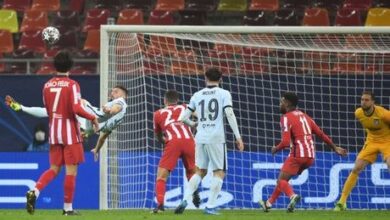Can Russell Wilson, Deshaun Watson and other NFL stars achieve LeBron James, James Harden NBA-level influence?

[ad_1]
In the NBA, LeBron James and the players have the power.
It wasn’t always this way, but James unearthed a previously untapped amount of player influence in basketball. He is a power broker, dictating where he plays and with whom.
Other stars have followed suit. Most recently, James Harden facilitated a trade from Houston to the Brooklyn Nets to join Kevin Durant and Kyrie Irving.
“The Decision” was an unprecedented event when James announced he was leaving Cleveland for Miami in 2010. Now, players dictating the NBA’s landscape is the norm — and also part of its widespread appeal.
In football, it’s different. Mechanisms like the franchise tag make it harder for players to reach free agency, and there remains a publicly assumed separation between church and state in NFL organizations — that the decision-makers and the players are not one and the same.
Only last year was Tom Brady, coming off 20 years and six Super Bowl wins in New England, able to secure his free agency and recruit the likes of Rob Gronkowski, Antonio Brown and Leonard Fournette to Tampa to win No. 7.
This offseason, though, it feels like something is changing.
Several star NFL quarterbacks have gone public with frustrations about whether their voice is being heard, included or honored in organizational decisions, from Deshaun Watson to Aaron Rodgers to Carson Wentz, to varying degrees and through different outlets.
The Detroit Lions’ Matthew Stafford was able to facilitate and steer a trade to the L.A. Rams — reportedly while vacationing in the same location as Rams coach Sean McVay, and nixing the Patriots and Panthers as options in the process.
Then the Seahawks’ Russell Wilson took it to an unprecedented level this week, publicly lobbying for more personnel power in deciding Seattle’s roster on “The Dan Patrick Show.” In his appeal, Wilson cited James’ influence in the NBA.
“When you think about [it], one of the reasons why Tom went to Tampa was because he felt like he could trust those guys and [coach] Bruce [Arians] was going to give him an opportunity,” Wilson said. “You think about guys like LeBron, he was able to be around great players that he can trust.
“I think for me, anytime you bring free agents in or other players, you want the best players,” Wilson continued. “And as a player … [you can] see who can really play. As a player, you really know … So I think that relationship is really key, and especially being a veteran player, that dialogue is very important … I think it helps to be involved more, but I think that dialogue should happen more often, in my opinion.”
How far can Wilson and the NFL’s elite quarterbacks push this, though? Are they pioneers, forging a new frontier of player power and influence in pro football? Or is there a line an NFL star will never be able to cross?
“I think we’re on the precipice of a truly new era in football,” former Jets GM and Dolphins executive VP Mike Tannenbaum said on the phone Saturday. “A year ago, which feels like a decade ago because of the pandemic, we were talking about 10 years of collaborative labor peace … I think where our sport is evolving is more toward the NBA where certain players — not all of them — but certain players will have the stature and financial wherewithal to take a stand against an organization for the things they believe in.
“This could be a historic and transformational offseason,” added Tannenbaum, who now runs The 33rd Team, an NFL website and football think tank. “It’s too early to say whether that will happen. These players could risk a lot of money if things don’t happen the way they want. But we’re in a day and age where some of these players have massive platforms and are able to use their platforms the way they see fit.”
Another league source put it this way when discussing Wilson, Rodgers, Watson and Wentz: “You’ve had four quarterbacks making over $30 million a year publicly share how disgruntled they are. It’s hard not to say it’s the LeBron James effect.”
———
THE POWER OF THE MODERN QB
There was a time in the 1990s when NFL agent Leigh Steinberg represented, in his words, “half of the starting quarterbacks on a given weekend.” The list included Troy Aikman, Steve Young, Warren Moon, Drew Bledsoe, Jeff George, Kordell Stewart and later Ben Roethlisberger.
So Steinberg speaks from experience when he says that it would be nothing new for an NFL organization to ask its quarterback for input on personnel decisions. He says star QBs “have always had something to say about their destiny.”
“With Troy Aikman and Jerry Jones, Jerry was always open to input,” Steinberg said on the phone Thursday. “Same with Steve Young and Carmen Policy [in San Francisco] — with the team asking what you think we need, what will make us better, and valuing that player’s input. Dan Rooney was always open [in Pittsburgh]. It would not surprise you that the best teams were the most open.”
Steinberg said Jones asked Aikman’s opinion on Deion Sanders, for example, before signing “Prime Time” to a big free agent contract in 1995. “Just from a standpoint that you thought your quarterback was a good evaluator of talent,” he said. And also because in the modern NFL, the franchise QB is the centerpiece of any healthy organization’s shared goal: to win a Super Bowl.
“The quarterbacks do have power,” he said. “So if they become disaffected, the old days of just because they’re under contract you can get them to play are over. There’s been an evolution of player consciousness. They want to be empowered to influence their situation, but that’s welcomed by many teams.”
Tannenbaum, in fact, said he included his quarterback in coaching searches with both the Jets and the Dolphins — and even solicited feedback in Miami from respected and “thoughtful” Pro Bowl center Mike Pouncey, who just retired this week.
“I was part of two head coaching searches where Chad Pennington and Ryan Tannehill both met quietly with the candidates,” Tannenbaum said. “We did that because we had a lot of respect for them and thought their perspective would be helpful. We told both guys we value your input. We might not go with the candidate you like the most, but it will be a factor. I think being a great leader is being a good listener. And there’s a time and place where certain players earn a way to have a voice.”
These days, the Steinberg Sports Entertainment Agency, led by Steinberg and CEO Chris Cabott, represents the Chiefs’ Patrick Mahomes and the Dolphins’ Tua Tagovailoa. And guess what? The Chiefs asked Mahomes’ opinion on running backs in last year’s draft, and Mahomes told them he loved LSU’s Clyde Edwards-Helaire. The Chiefs then drafted him No. 32 overall.
Chiefs coach Andy Reid also solicits creative wrinkles and play designs from Mahomes and other players to include in weekly gameplans.
Steinberg believes the increased emphasis on the passing game and exponential increases in revenues and salaries have placed unprecedented significance and value on the quarterback position. So their standing and influence naturally has grown.
“One thing you’ve seen change is that position has become so difficult to fill, and its necessity is so apparent, that the franchise QBs both publicly and privately have aggregated real power over their teams,” he said. “At a certain point, the quarterback evolved into a position where it would be ridiculous not to talk to him. So the better organizations do.”
So Steinberg doesn’t view Wilson’s public comments as an indication he has no voice in the organization. Instead, to him it signals a breakdown in private communications already taking place.
Interestingly, though, Steinberg does not endorse a quarterback taking his power public, because he believes it changes the nature and influence of it.
“I’ve always told a player you’re perfectly entitled as an adult to say things about circumstances you’re working in,” he said. “But we have to do this privately because you can’t put a team against a wall. You might even have an owner who might do the exact opposite of what you want. And secondly, you’re destroying the ability of your team to do a reasonable trade if that’s what you want.”
Indeed, Watson has not succeeded in getting the Texans to trade him yet. Wilson hasn’t forced Seattle’s hand to do anything, if that is his intent.
“In my experience, the most influential conversations impacting the outcome often happen behind closed doors,” Tannenbaum agreed. “If you have suggestions, there’s a time and place for us to have those conversations, and doing them publicly isn’t the most effective way to do that.”
Recently in the NBA, however, Harden’s public frustrations with the Houston Rockets did not hinder a trade. He was able to force his way to Brooklyn, and the Rockets got back three first-round picks and four first-round pick swaps in return.
So what’s different about basketball? It only makes sense to ask one of the power brokers who helped facilitate Harden’s trade.
———
JUMPING THROUGH HOOPS
Chafie Fields, executive vice president of team sports at Wasserman, is an agent to NBA and NFL stars. When Harden wanted out of Houston, he hired Fields and Wasserman COO Jason Ranne, who worked with all parties behind the scenes to make it a reality.
Fields says football and basketball are inherently different. There are only a handful of NFL players who might even approach the level of influence NBA players have.
“Only the elite of the elite,” Fields said on the phone Friday. “And I don’t think it’ll be equal to the impact that the guys in basketball have, but to a lesser degree. Elite quarterbacks are always gonna have a say, per se. Not to the degree of a LeBron James or a James Harden or guys of that stature. But the quarterbacks that are elite will be the closest thing to that.”
Not that NBA players are just bending teams to their will. Fields stressed that in Harden’s situation, for example, a trade was only consummated because the Rockets were collaborative partners and that “whatever was to occur was going to be beneficial to all parties involved.”
But in the NFL, Fields said the financial landscape makes it more difficult for a player to achieve the kind of influence and movement that a star like Harden swung this winter.
“If the team doesn’t want it, it’s not gonna happen,” Fields said. “First and foremost, the salary cap is structured differently. In the NFL, it’s more of a hard cap. Specifically this year with COVID, there’s gonna be some issues that need to be figured out. With the cap going down for the first time ever, and quarterbacks like Russ and like Deshaun having the cap hits they’re gonna charge, it’s hard to trade another player or players that’ll offset the difference. So it’s not as easy as it would be in the NBA to trade a QB, because he’s always gonna account for so much of that salary cap.”
Like Steinberg, Fields pointed out that elite NFL player influence has been exerted effectively behind the scenes in several cases, such as Stafford’s with the Lions.
“That was a mutual thing because the team was in agreement with him to give him the ability to do it. J.J. Watt, same thing [in Houston],” he said. “He and the team were on the same page. They have an understanding, and it makes sense for everybody.”
Every player’s situation is different, too. The Lions and Texans both are rebuilding, for example. Watt was a veteran with an unsustainable $17.5 million cap hit compared to Watson, 25, a young and elite QB who just signed a long-term contract extension.
“Moving a player that’s under contract and playing at a high level doesn’t make a lot of sense on its face,” Fields said. “So it has to be a situation in football that’s a little different that it has to make sense for both sides.”
That said, Fields said “I commend’ players like Watson standing up for themselves publicly when they feel like they aren’t being included the way they feel they deserve.
“I do feel like it’s a situation where when you are the face of the organization and to a big degree the face of sports in that town, he should have a say as it relates to who’s around him, so to speak,” Fields said. “Because he’s in the locker room, he understands what’s going on in the locker room, what the guys want, what they need. So if they don’t feel it necessary to go to the voice of the locker room and inquire about what he thinks about the team and what it needs …”
Then in the modern NFL, that simply doesn’t align with the influence and empowerment of the modern star quarterback.
“It’s not the same as basketball, unless these guys make it a point to get to free agency like LeBron did,” Fields said of player movement in the NFL. “But let me put it this way: when LeBron did what he did [with “The Decision” in 2010 3/8, what did he do wrong? He was a free agent. Why were people upset? They were so upset because they weren’t used to a player deciding on his own future, almost as if he doesn’t have a right to.”
Similarly, maybe NFL players like Wilson and Watson being this vocal in 2021 is shaking football’s foundations. And in Wilson’s case, every person interviewed for this story was blindsided by the Seattle quarterback’s strong public statements of discontent.
Still, while going nuclear on an organization might not be the most effective strategy, Fields is encouraged by players using their voice. NFL teams can cut players without consequence if they don’t perform. It’s only right that a player speaks up when he sees something not in his or his team’s best interest.
“I commend all these guys,” he said. “There’s a way to do it, don’t get me wrong. But I commend anyone that’s willing to stand up for themselves.”
So here’s an important question specifically when it comes to Wilson and Watson: will their tactics work? That could be the deciding factor in shifting the balance of power in football — unless of course, it already happened and we just don’t know it yet.
———
THE GRAY AREAS
Michael Lombardi, former NFL GM and host of “The GM Shuffle” podcast, says Wilson’s appeal for personnel power is a red herring for the quarterback’s real desire.
“He wants more money,” Lombardi said on the phone Friday. “This is about money. It’s not about anything else than that. Mahomes got paid. Watson got paid. This is [Wilson’s] way of complaining about money without saying money.”
This is a real and reasonable position that players adopt in all pro sports: comparing themselves to others and wanting their salaries to reflect their standing. Mahomes’ deal ($45 million average annual value through 2031) and Watson’s ($39 million through 2025) have eclipsed Wilson’s ($35 million through 2023), per overthecap.com.
“It’s just I don’t wanna look like I’m money grabbing so I’m gonna talk about something else,” Lombardi said.
Many believe the Packers’ Rodgers ($33.5 million through 2023) is also motivated by wanting his status reflected in both his influence and his pay coming off a third MVP award.
Some on the management side also have a dramatically different view of player involvement in personnel matters.
Lombardi’s response to whether QBs are routinely given a voice in personnel decisions was “of course not.” He has worked for Bill Walsh in San Francisco, Al Davis in Oakland, Bill Belichick in New England, and was the Browns’ GM in 2013.
Lombardi said quarterbacks do have a voice in organizations, no question, but almost never to the extent that Wilson described this week. He cited Peyton Manning’s input on the Indianapolis Colts’ offensive personnel as one such rare example.
Some current and former league executives responded to a player having personnel say with their own versions of “when pigs fly.”
Phil Simms, the two-time Super Bowl winning Giants QB, Super Bowl XXI MVP, and CBS analyst, chuckled when asked if he’d ever been consulted on personnel matters.
“It would be laughable beyond belief to think that I ever had any say in anything that went on in personnel with the Giants,” Simms said on the phone Friday.
That said, Simms conceded he was a different level of player, that was a different time, and the major money paid to starting QBs in 2021 makes far less of a risk for them to speak up.
“If you suggested somebody to the GM, there’d be no chance they’d bring him in,” Simms said. “It’d be you play and we’ll take care of this. I never had the power of course of Russell Wilson or any of these guys talking because money wasn’t guaranteed and I’m not in the same league as they were. So that does give them a chance to speak. But the guaranteed money makes it easier. They all know if it falls apart there’s definitely a team willing to come get them and give them some of the things they want.”
Simms said that when a player voices frustration like Wilson did this week, “the first thing that comes to my mind is money” as the potential motivation. But he cautioned that each situation is different. Watson, for example, clearly feels betrayed by Houston.
“They’re trying to pass off a message to the team,” Simms said. “It could be I want a new contract, or add on to what I got. It could be ‘guarantee me more money.’ Or open the offense, I want it to be more about me.”
Or it could be that we’re looking at this all wrong. Maybe these quarterbacks aren’t trying to open the floodgates on player influence. Maybe the dam already broke and we don’t know it yet.
———
WHY NOW? WHAT’S NEXT?
Jamal Adams isn’t even a quarterback, and the star Jets safety used his large platform and social media presence to publicly force a trade to the Seahawks last July.
The feeling of some league sources is that a dangerous precedent already has been set.
Even Stafford’s trade, while handled behind closed doors, featured a high-profile QB — and a much less successful or talented one than Wilson or Watson, at that — wielding influence to steer the course of his and his organization’s directions.
Some executives believe whether Watson succeeds at forcing his way out of Houston could create that historic “transformation” in player influence that Tannenbaum projected as possible.
“I think there’s a threshold that I personally don’t want to see crossed,” one league source with more than 20 years in the NFL said.
That source and several others working in the league believe that player influence is one thing; NBA-level power to dictate the fortunes of the league are another.
If quarterbacks already making up a large chunk of NFL teams’ salary caps are able to wield the kind of power that renders the commitment of those contracts insignificant, there would be no way to walk it back once football goes that route.
Teams building around star quarterbacks could be left in the lurch, while a QB relocating to a new team would be far from a guarantee that he would win.
“This isn’t like the NBA. You can’t add one piece and become an instant contender,” one former league executive said.
Simms, therefore, is watching the Watson situation closely. It could set a precedent either way.
“If Houston digs in and won’t trade him, that might change how the other quarterbacks act,” he said.
Brady’s situation, while it may create envy among other star quarterbacks, is considered by many to be an outlier.
He did battle behind closed doors for influence in New England. But he only found the freedom to execute his plan by getting to free agency. And that only happened when Patriots owner Robert Kraft agreed not to franchise tag him in 2020.
To players like Wilson, however, Brady’s departure and Adams and Stafford trades are not outliers. They are reflective of what the modern NFL is becoming: a players’ league.
More than ever, these players don’t just have a platform that comes with more money. They also talk: between sports, within football. And they know how and why other star players are getting their wish.
Steinberg also pointed to the past year’s social activism as a coinciding “thrust towards empowerment” by reinforcing especially for the star QBs that they have a “strong public voice.”
On “The Colin Cowherd Podcast” this week, Philadelphia 76ers executive VP of operations Daryl Morey spoke insightfully on why the NBA supports player voices and perspectives in setting and driving league narratives off the court.
“Look: the players are the product,” Morey said. “The players — in really every sport, but in the NBA the most — are why people tune in. I think they should have a big seat at the table.”
Back in 1982, NFL players’ union head Ed Garvey led football’s players in challenging the league over their rights to increasing revenues.
The slogan that the NFL players used back then to generate public support was “we are the game.”
That was almost 40 years ago. It took a while, but it’s intriguing to think that almost 40 years later, that might not just be a slogan in football.
It may be the reality of where the business is heading — or has already arrived.
[ad_2]
Source link






